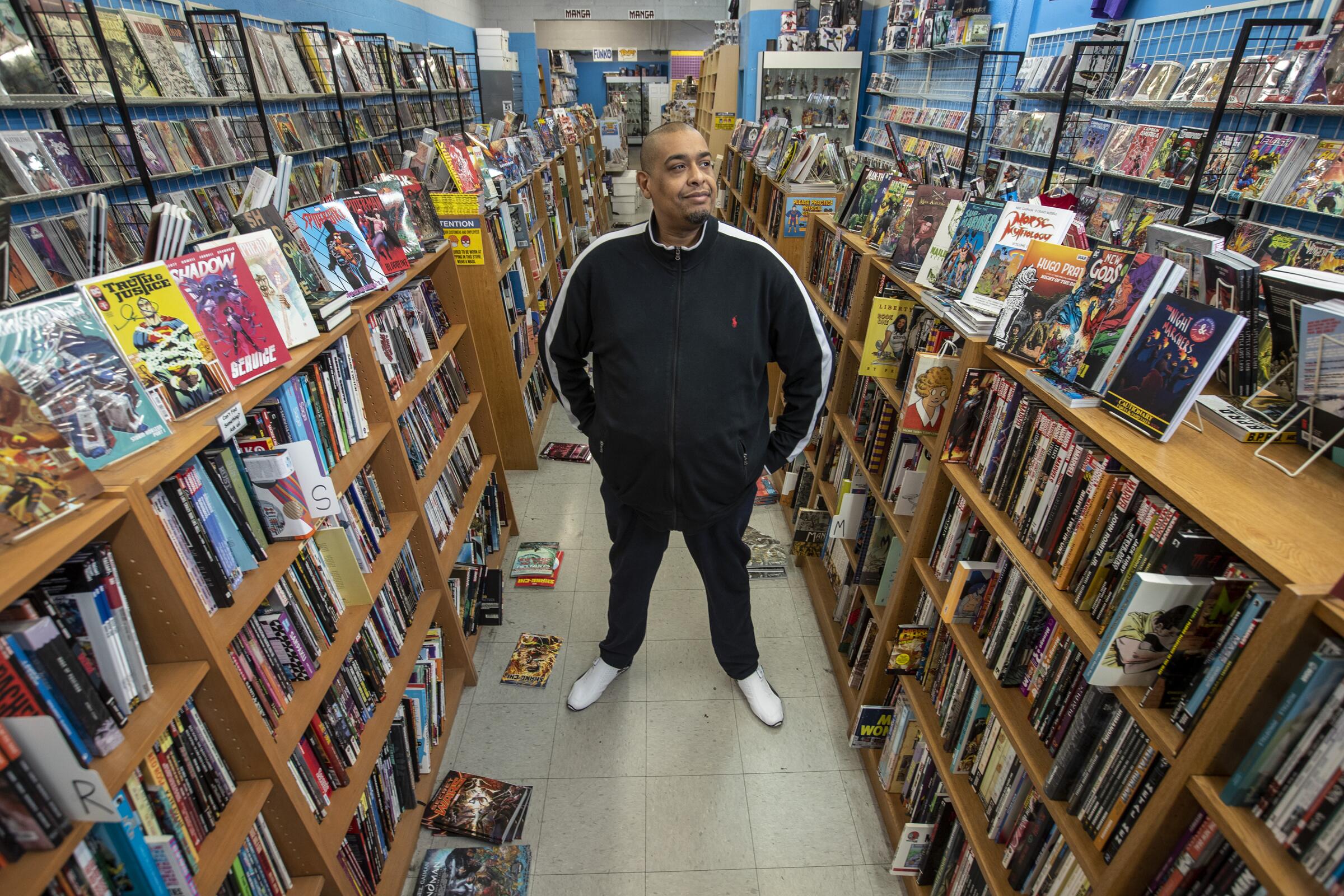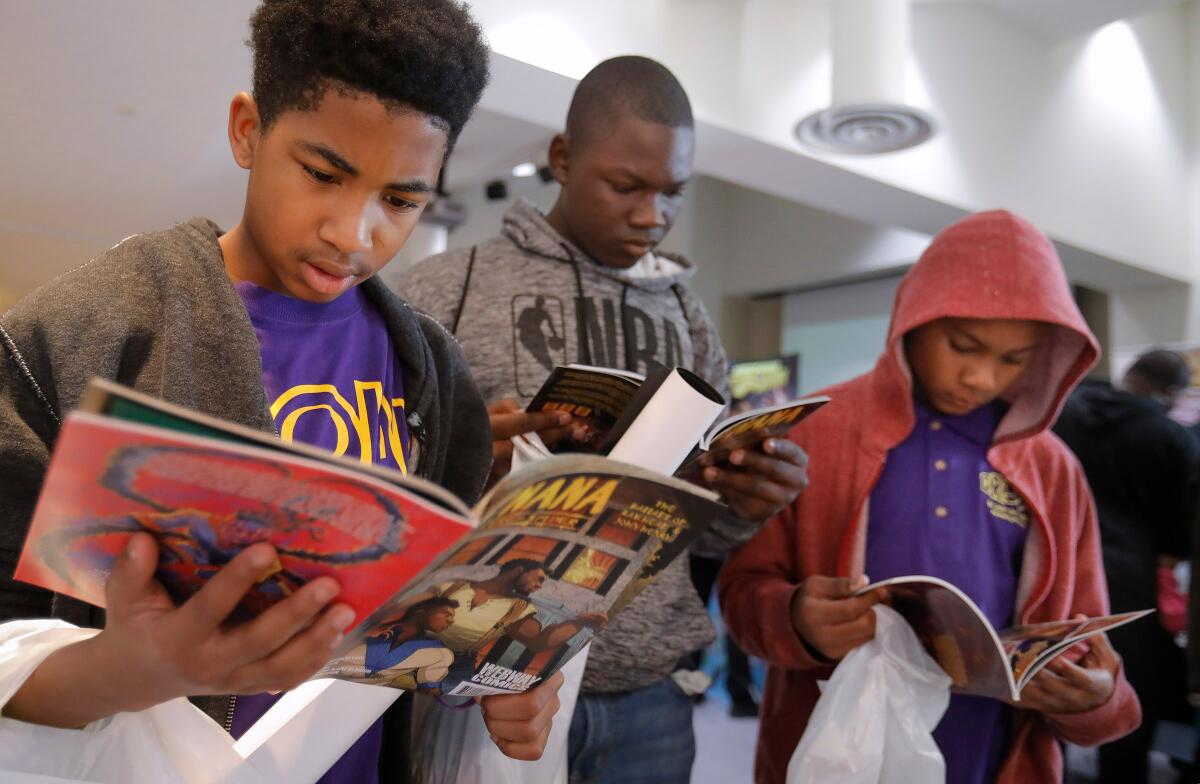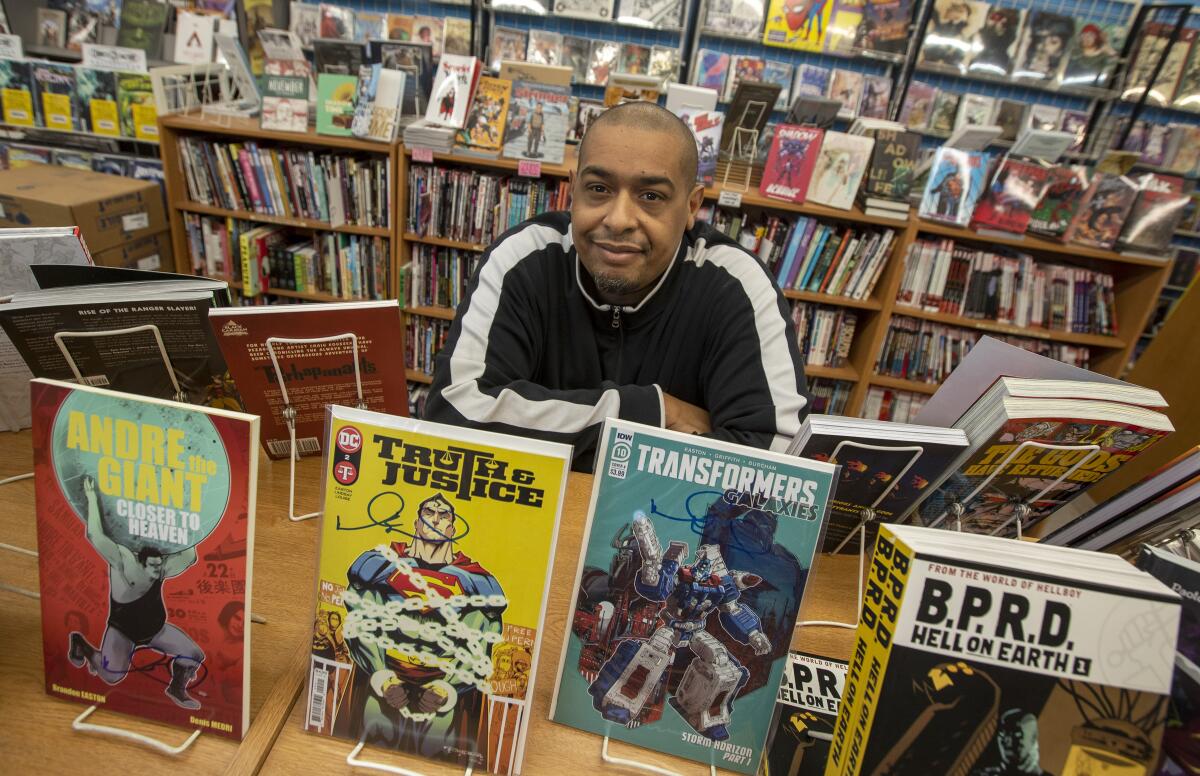The biggest entertainment stories
Get our big stories about Hollywood, film, television, music, arts, culture and more right in your inbox as soon as they publish.
You may occasionally receive promotional content from the Los Angeles Times.

Marvel’s “Black Panther,” one of the all-time highest-grossing films at the worldwide box office, is the starkest recent reminder that stories led by Black characters made by Black creators have monetary value to the mainstream when done right. The CW’s “Black Lightning” and Netflix’s “Luke Cage” brought Black superheroes to television, and in the just-concluded Disney+ series “The Falcon and the Winter Soldier,” Anthony Mackie’s Falcon, after some initial resistance, becomes Captain America. But before these Black superheroes were seen on movie and TV screens, they were in comic books.
It’s true that, as in other parts of the entertainment business, issues of representation have plagued the world of comic books. Yet Black storytellers in the comic book industry are no longer invisible. They’re also not one-offs without voice or vision or impact within the industry.
“I’ve been reading and collecting comics for 40 years, and this, right now, is probably the most diverse it’s been,” says Geoffrey Thorne, who currently writes “Green Lantern” for DC Comics. “Marvel and DC have both been taking pains to bring in people of different ethnicities, different genders — queer, cis, whatever. Stories are being written by those who come from these types of groups.”

We asked a few current comic book creators about the state of the industry for Black professionals and the influences helping shape today’s heroes. They disagreed on the reasons for this moment of inclusion and the depth of the change. One thing they all shared: deep reverence and gratitude for Dwayne McDuffie, the late comic book writer, TV producer and co-founder of Milestone Media, where a diverse band of artists and writers created the Dakotaverse, a world of Black, Asian and Latino superheroes.
A new generation of Black artists is amending and countering comic books’ racist roots. They join a proud tradition of Black pioneers.
Artist on “Black Panther World of Wakanda” and HBO’s “Lovecraft Country”
On the industry: We are at a turning point in our media. We see changes not only in graphic novels but television and film as well. The audience gets to determine what gets to have another season. To that end, we have to put our money where our mouth is.
Comics, like the rest of the world, have been impacted by COVID-19 in unusual ways. In some instances, people are reading more than they did before. The primary distributor shifts [between publishers and retailers] have changed the pipeline. Each change comes with its own set of sacrifices and rearranging. Hopefully, it will result in a better system than before.
Sign of progress: It was a pleasure to work on “Lovecraft Country” with HBO. There was an effort to hire men and women of color in a significant way. I felt supported and appreciated. The props master I worked under, J.P. Jones, looked around and whispered, “This is the most people of color I’ve ever seen on a major production like this.” A proud moment of realization.
Why representation matters: I hope it can be inspiring that someone who looks like me has a place at the table and can subsequently make their table.
Favorite characters to draw: I love drawing the X-Men. They are the outcasts that are feared but still show up to save the day. I’ve been excited to draw my characters in an [Image Comics, Kickstarter-fueled] series I have coming up called “Aquarius: The Book of Mer” [in stores Aug. 11].
Executive editor of Heavy Metal and “Access Guide to the Black Comic Book Community,” writer on “MPLS Sound”
On the industry (and if there were a G7-style summit for comic book publishers): I would say the G7 would be Marvel, DC, Dark Horse, Boom! and IDW. A Top 5. The leaders of those companies would convene to set the ethical standards for the comic book industry. Two of the things that would be at the top of the list would be racism and sexual harassment — and the total eradication of both from the comic book industry.
On helping create a “Green Book” for comic book fans: [The “Access Guide to the Black Comic Book Community”] allows the general public to have exposure and knowledge of different Black creators, the books they’re creating, the publishers that hire them, and the Black-owned publishers, the Black-owned comic book stores and the Black-founded comic book conventions throughout the United States.
It’s a book that, by its nature, would show Black people what companies are safe spaces for them. Based on various experiences I’ve had in the industry, there are comic book stores that are not safe spaces for Black people. There are comic book conventions that are not safe spaces for Black people. There are comic book publishers that are not safe spaces for Black people. The book is a road map to the safe spaces.
Favorite characters of color: Misty Knight and Rocket from Milestone.
Writer on “Judge Dredd,” “Transformers” and “Mr. Miracle”

On the industry: There’s less reluctance now to hiring proven creators of color in this industry. It wasn’t always that way. There was a time when only TV writers and film writers like Reginald Hudlin and Dwayne McDuffie were even able to get close.
The indie scene has always had a lot of Black creators. It’s just that they don’t have the marketing budget that Marvel or DC or any of the other bigger companies have. So, right now, there’s a continuing renaissance that’s been going on since the early 2000s of Black independent creators. That’s where a lot of the creativity and a lot of the excitement can be found.
There’s been significant movement forward pretty much since the release of the “Black Panther” movie. It was a watershed moment for Black creators specifically. It showed the powers-that-be that having characters of color, specifically Black characters, can be financially profitable. Really the only thing that makes a difference in the world is money. Nobody cares about social responsibility and social justice. What they care about is the bottom line.
The evolution of Black superheroes: There’s a move to push Black superheroes away from crime. In the past, a lot of Black heroes were reformed pimps and reformed criminals. People like Luke Cage and even the Falcon, in the past, they were not decent human beings overall — they became heroes later. Now they can be just people who have powers. Regular people or a scientist — someone who wasn’t on the wrong side of the law. It’s a societal shift, not just in comic books, where characters aren’t just crime-based anymore. Overall, when you get away from cop shows, you see a broader representation of Black people, and that’s filtered down to comics.
Influences: Guys like Dwayne McDuffie. Christopher Priest. People like Spike Lee and John Singleton. Bill Duke. Folks like that have been tremendously inspiring to meet because they were Black men telling Black stories that were not always rooted in Black pain and hostility.
Favorite character of color: Night Thrasher.
Writer on “Naomi” and “The Black Panther Party: A Graphic Novel History”
On the industry: For a variety of reasons, the comic industry is in a state of uncertainty. The big publishers are trying to hold onto their place in the market [with] the same old bag of tricks they’ve been using for years. One of those tricks is utilizing the talent of a select number of people of color, or women, or other marginalized folks, and using them as ambassadors of diversity and inclusion.
Black heroes onscreen: The only real consideration that needs to be taken into account is whether or not the white people in power are willing to give up their control enough to let people of color have some say in how we are depicted on the screen. There are some white people who seem to think they know more about people of color than we know about ourselves.
The complex history of the Black Panther party ... as a graphic novel?: For many people, myself included, it is much easier to process information when there is a visual component. I believe if you can simplify certain complex subjects and juxtapose these subjects with some cool images, you’ve created an easy entry point for people.
Favorite character of color: The Thing. Even though he was a white man, in my mind he was basically a Black person because people judged him by his outward appearance and reacted to him like he was a monster.
Writer of “Green Lantern” and “King in Black: Black Panther”
On the industry: The absorbing of [comics] companies by big entertainment companies is changing some of the rules about who gets to pick who tells their stories. Those companies are interested in the mass audience, and the mass audience is diverse. So they’ve figured out, finally, that Black folks have money to spend. The optics on who’s writing that story does get execs thinking, because they’re greedy, about who they’re going to hire to tell those stories. I don’t always think that’s good. I certainly want to go with the best writer. But the best writer was sometimes a person who didn’t get the job because they were Black. So if the pendulum shifts a little bit back to these people who’ve never had a voice before, I’m fine with it for a while. Why not?
Favorite character of color: The Prowler.
The biggest entertainment stories
Get our big stories about Hollywood, film, television, music, arts, culture and more right in your inbox as soon as they publish.
You may occasionally receive promotional content from the Los Angeles Times.